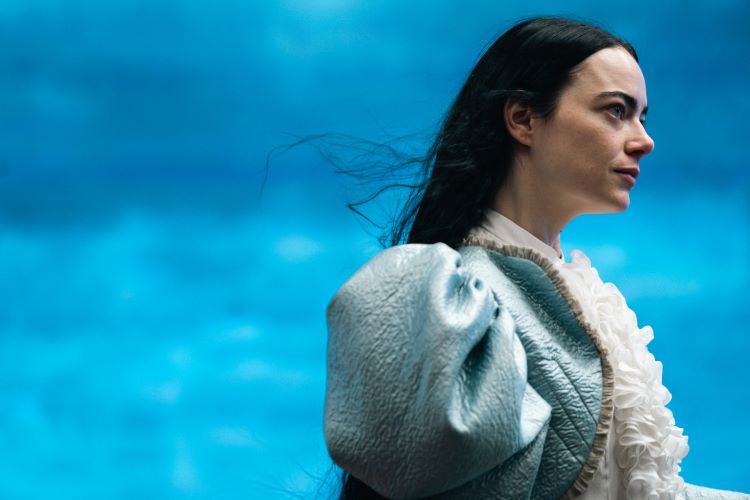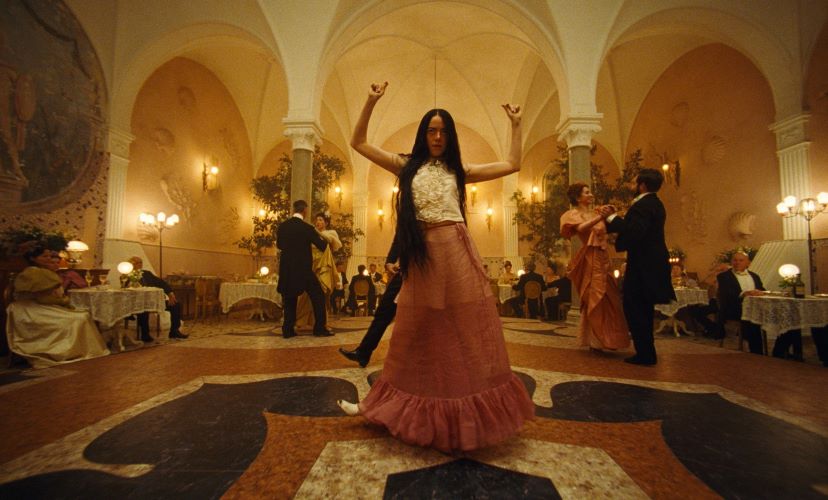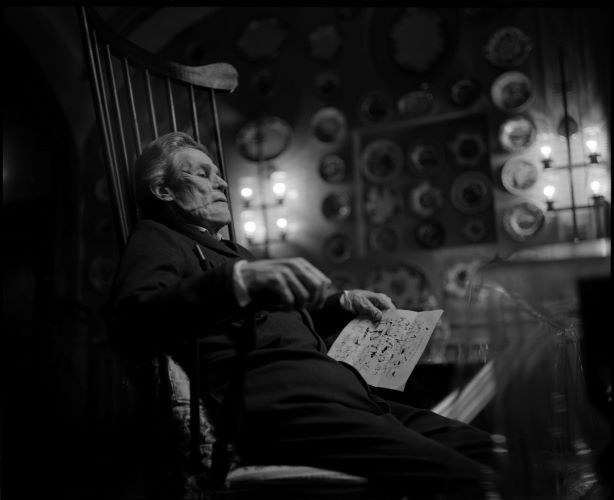
Yorgos Lanthimos fearlessly dives into the treacherous waters of ambivalence with Poor Things, a luxuriously textured film that revels in the bizarre, and touches the elusive, shifting truth of human feelings as they glimmer in the depths. Resisting any simple categorization, Poor Things is a riff on Mary Shelley’s Frankenstein delivered with a half-smile, a sci-fi horror film that evokes classics from the 20s and 30s such as The Cabinet of Dr. Caligari, a unique coming-of-age narrative, and at times, it is laugh-out-loud funny. The fascination with the tension between social norms and desire, family relationships, issues of power, boundaries, loyalties, and the mysteries of education that may be seen in Lanthimos’s previous films – Dogtooth (2009), The Lobster (2015), and The Favourite (2019), is evident here as well, forming the film’s central themes. Flexing all her creative muscles in a role so insanely demanding it might have devolved into caricature in less capable hands, Emma Stone is radiant, delivering a transcendent performance that captures the wild, weird, joy of being alive.
Poor Things is a film that raises more questions than answers, and that is just one of the many things that I love about it. Set in the Victorian age of the imagination, its premise is horrifying. Dr. Godwin Baxter (Willem Dafoe), whose face is a ravaged patchwork of scars, is raising Bella (Emma Stone) as a science experiment. Horrifying. Dressed in white lingerie, the Victorian heroine of this film is given a chance to meet life with a blank page, and begin anew, experiencing everything without any pressures or prejudice. But can the page ever be truly blank? From the moment we achieve consciousness (and there is strong evidence for all that impacts us before then), we are affected by the environment that surrounds us, as inevitably, is Bella. Pounding on the piano, walking with a toddler’s uncertain gait, or dropping porcelain plates for the sheer delight of noisy transgression, Bella meets life with a gleam in her eye, endless curiosity, and vivacious energy. Living with Godwin, whom she rather aptly calls God, the surgery is as familiar as the kitchen to Bella, and she, like any young child, wants to do what the grownups do – in this case, cut into bodies. But because she is still learning – “just dead ones.”
Stone’s Bella is eerily enchanting and mesmerizing. What sounds cringey, demeaning, and revolting – a woman who behaves and thinks like a toddler, becomes fascinating in Emma Stone’s brilliant interpretation. As she explores the world around her, she keeps pushing at the boundaries set by Godwin, and it is this surging desire for experience and independence, as well as Godwin’s response to it, that gives the film its depth.

Poor Things has a wonderful flow to it, as Bella embarks on her many adventures. Tony McNamara’s screenplay, based on the novel by Alasdair Gray, is playful and clever. As Bella develops her sense of self, world view and language skills, her idiosyncratic syntax and word choices are both amusing and wonderfully apt. Although Godwin seeks to keep Bella in a pure, controlled, scientific environment, Bella has different thoughts, and is not afraid to act on them. She agrees to a marriage with the malleable, good-intentioned yet naïve doctor Max McCandles (Ramy Youssef), whom Godwin has brought in to document Bella’s every move, but when opportunity arrives in the shape of a very louche lawyer, Duncan Wedderburn – deftly portrayed by Mark Ruffalo with sleazy sex appeal, Bella is ready to rebel.

Bella’s adventures take her to many locations, each giving the brilliant creative team of the film an opportunity to create fantastic worlds, with an elaborate, dreamlike, pastel, Steampunk look. Evoking classic films of the 20s and 30s, the first part of the film, when Bella lives with Godwin the crazed genius, is in black and white, with cinematographer Robbie Ryan’s occasional use of a fish-eye lens to give it a nightmarish quality. As Bella discovers the pleasures of the body, and in her new-found freedom has sex with Duncan, the screen bursts into richly saturated color. Unfettered by society’s norms, Bella chooses pleasure.
Discovering the pleasure and power of her sexuality is central to Bella’s journey towards a sense of herself and her place in the world. In its emphasis on sex and sexuality, and in particular, the transactional aspects of sex that Bella explores, the film runs the risk of regarding Bella in conventional, patriarchal gaze in the guise of a narrative of a woman’s search for freedom and empowerment. Balancing that risk is Emma Stone’s fiercely powerful, and courageously absurd performance as Bella, ever honest, ever curious, ever open to discovery. Contributing as well to a more diverse depiction of women are the supporting characters that Bella encounters and the excellent performances of the actors. Kathryn Hunter (The Tragedy of Macbeth) brings an ominous mystique to her portrayal of the perfectly-named Parisian brothel Madam – Swiney. The many ways of finding one’s way in life are also demonstrated by Toinette (Suzy Bemba), Bella’s socialist friend from the brothel, and the older Martha (Hanna Schygulla), who reveals that she finds what is between her ears to be more compelling than what is between her legs.
Poor Things premiered at the 80th Venice International Film Festival in September 2023, where it won the Golden Lion, and it has been nominated for 11 Academy Awards including Best Picture, Best Adapted Screenplay, Best Director, Best Actress for Emma Stone, Best Supporting Actor for Mark Ruffalo, Best Original Score, Best Cinematography, Best Production Design, Best Makeup and Hairstyling, Best Costume Design, and Best Film Editing.
Poor Things
Director: Yorgos Lanthimos; Screenplay: Tony McNamara, based on the novel by Alasdair Gray; Cinematography: Robbie Ryan; Editor: Yorgos Mavropsaridis; Music: Jerskin Fendrix; Cast: Emma Stone, Mark Ruffalo, Willem Dafoe, Ramy Youssef, Kathryn Hunter, Christopher Abbott, Jerrod Carmichael, Hanna Schygulla, Margaret Qualley, Suzy Bemba, Vicki Pepperdine





